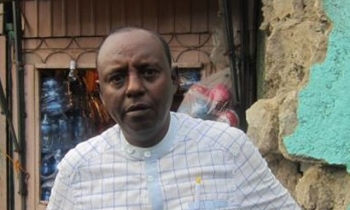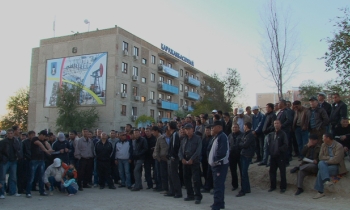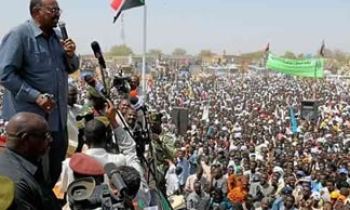Ukrainian public opinion could come even more under the influence of official views from Moscow following the announcement of a recent multi-million-dollar media purchase in the Russian capital.
Moscow-based Kommersant Publishing House, which publishes one of Ukraine’s leading business dailies, Kommersant Ukraine, has been sold to Kremlin-connected tycoon Alisher Usmanov for about $300 million, according to an Aug. 31 article in the paper.
The sale is the biggest seen yet on Russia’s publishing market, the paper said, without revealing exactly when, where or by whom the agreement had been concluded.
The Aug. 31 article quoted Kommersant Publishing House General Director Demyan Kudryavtsev as confirming that 100 percent of the publishing house’s shares had been sold to the 52-year-old Usmanov, who is the president of Gazprominvest Holding, a 100 percent subsidiary of Russian state gas monopoly Gazprom, and a co-owner of Metalloinvest, a metals holding company.
“Mr. Usmanov underlined that he wants to see the publishing house profit and develop, and that he won’t interfere in the editorial policy,” Kudryavtsev was quoted as saying by the paper.
Kommersant Ukraine also quoted Usmanov as saying that the buy has nothing to do with the Kremlin: “This is my personal deal, my personal investment … No one asked me to buy this publication.”
The publishing house’s previous owner was Badri Patarkatsishvili, who bought it from Russian businessman in-exile Boris Berezovsky last February. Berezovsky, a fierce critic of the administration of Russian President Vladimir Putin, currently resides in London. Patarkatsishvili is also a wealthy businessman sought by Russian law-enforcement agencies.
Kommersant Ukraine General Director Kazbek Bektursunov told the Post that although the sale funds have yet to be transferred and some paper work remains, “the fact of the matter is that the deal has been completed.”
Like Kudryavtsev, Bektursunov also said that the paper’s editorial policy, as well as its staff, would not change.
“Kommersant has always been stronger than its owners. I guarantee there will be no changes in Ukrainian Kommersant,” said Bektursunov.
Boris Timoshenko, head of monitoring at the Glasnost Defense Foundation, a
Moscow-based non-governmental organization that provides legal support and advocacy to Russian media, disagrees.
The sale of Kommersant Publishing House is about Kremlin politics, and the newspaper’s Ukrainian and Russian editions will be influenced accordingly, he told the Post on Sept. 1.
“It was much more convenient for certain figures not to buy Kommersant from Berezovsky directly, but to acquire it from a second person. It’s not a coincidence that the deal took place just a year before the parliamentary, and two years before the presidential elections [in Russia]. In one year Kommersant will be different. It is also logical to predict there will be more influence on Kommersant Ukraine,” he said.
Natalia Ligacheva, chief editor of the Kyiv-based media NGO Telekritika, also sees politics in play.
“The acquisition has underlying political reasons,” Ligacheva told the Post.
“There probably won’t be total control of publications belonging to the [Kommersant] publishing house, but the fact of the matter is that it’s now state-owned,” she added, referring to the publishing house’s closer ties to the Kremlin as a result of its purchase by Usmanov.
In its 2005 annual report, the U.S.-based non-governmental organization Freedom House said Russian media freedom has declined radically under President Vladimir Putin due to excessive state control, self-censorship among journalists and the purchase of national media outlets by the state or Kremlin-friendly buyers.
“Practice shows that Kommersant may well lose its face, its influence and its readership,” said Timoshenko, who recalled Russian newspapers like Gazeta, Izvestia and Nezavisimaya Gazeta, which he said were also snapped up by Kremlin-friendly owners before shifting their reporting from serious to softball journalism.
“Gazeta, also bought by [Russian] steel magnate Vladimir Lisin, has joined the group of these colorful, superficially successful, but bland publications,” he added.
Leonid Bershidsky, the chief editor of the Russian magazine Smart Money and former chief editor of the Russian broad sheet Vedomosti, sees Kommersant’s purchase as part of a Kremlin strategy, facilitated by people like Usmanov.
“All the recent acquisitions of publication companies make it obvious that only publishing companies with foreign owners and investment will have a chance to be free and objective in giving news. Usmanov has always provided services to the Russian government,” he said.
But Bershidsky played down the significance of the Kommersant Publishing House purchase for Ukraine.
“I don’t think the deal has anything to do with Kommersant Ukraine or the latest political events in your country. To tell the truth, Kommersant Ukraine has always been a budget hole for the publishing house and it never gained the positions close to those of Kommersant in Moscow,” he added.
Kommersant Russia is the flagship publication of Kommersant Publishing House, which reported $64 million in sales and $13.1 in net profit in 2005. The company expects to earn $70.4 million this year, with net profit of $15 million.
Kommersant has a circulation of nearly 123,000 and is distributed in 16 cities in Russia. Since July 2005, there has been a Kommersant Ukraine edition with a daily national circulation of 10,000 to 15,000.
The publishing house puts out other publications in Russia, including the weekly business magazines Dengi (Money) and Vlast (Power), which aren’t published in Ukraine.
According to The Moscow Times, an English-language newspaper in Russia, Usmanov has no known experience or assets in media and will complete the purchase of the publishing house using a recently registered offshore firm, Mediaholding, which has no other assets.
Usmanov’s company Gazprominvest, a 100 percent subsidiary of Gazprom, manages Gazprom’s debt and handles some of the gas monopoly’s assets.
The Moscow Times reported that prior to the collapse of the Soviet Union, Usmanov spent some time behind bars on fraud charges. Following his release, he built a fortune in the iron-ore market.
Prior to the purchase of Kommersant Publishing House, which Kommersant Ukraine reported as being the biggest to date on the Russian publishing market, Finland-based Sanoma SWOY acquired Russia’s Independent Media Publishing House for $185 million.
In addition to newspapers, Ukraine’s leading television channel, Inter, is reportedly 29 percent owned by Russian television station ORT, widely considered to be a mouthpiece for the Kremlin.









